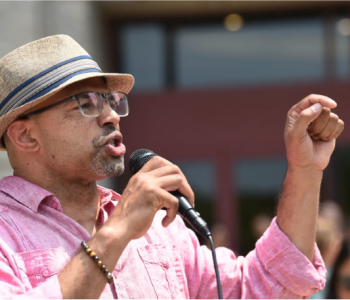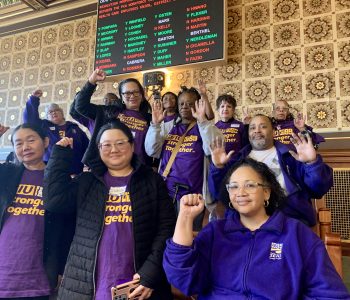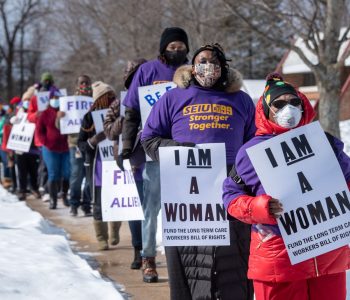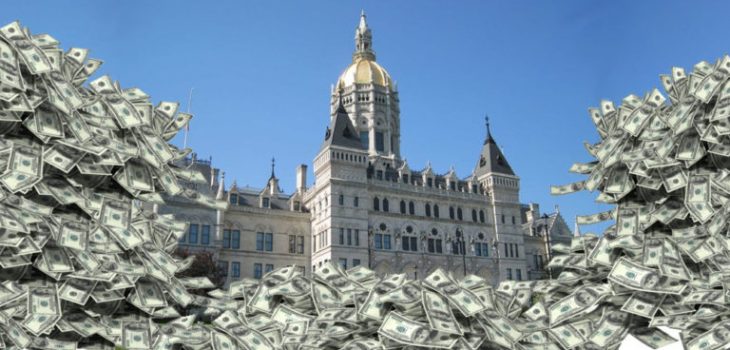 Featured Post
Featured Post
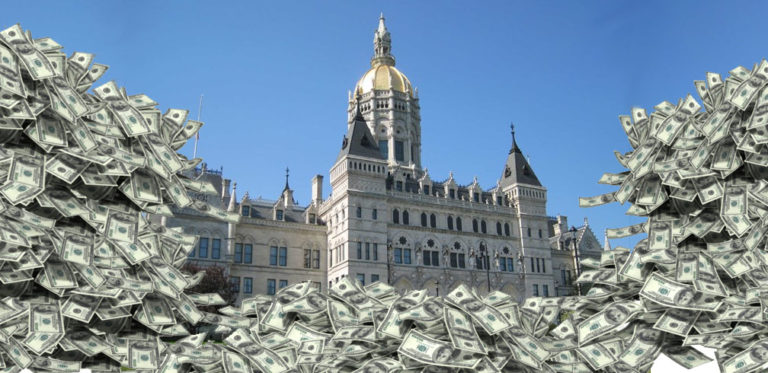
A coalition of labor leaders, progressive legislators and other activists upped the pressure Monday on Gov. Ned Lamont and the General Assembly to tax Connecticut’s wealthy to preserve vital services coming out of the coronavirus pandemic.
The “People’s Recovery” plan offered by the Bargaining for the Common Good coalition is centered on households earning more than $1 million annually and corporations with gross income topping $100 million per year.
“We’re here calling for the help of the legislature to tip the scales in the direction of justice by moving towards greater tax equity,” Rob Baril, president of the state’s largest healthcare workers’ union, said during a late-morning press conference outside the Capitol.
“A child that’s born in the city of Greenwich just has a different life opportunity ahead of him than somebody born in Hartford and Bridgeport and New Haven and Norwich,” he said. “Education, health care, housing livable wages, a fair retirement — those things should be a condition of birth, as opposed to something that are available only to the privileged few. And our state’s budget, our state’s tax dollars, can move in that direction.”
But Lamont’s budget office says state finances, unless adjusted, are headed deep into the red, with projected gaps of more than $2 billion — or about 10% of the General Fund — in each of the next two fiscal years.
The governor, a Greenwich businessman, has steadfastly opposed raising state income tax rates on Connecticut’s wealthy as a means to expand government services or to fund state tax relief for low- and middle-income households, arguing it would prompt wealthy taxpayers to flee the state.
Democrats from affluent Fairfield County also have gained several House and Senate seats in recent years, and they also are wary of raising taxes on the wealthy and of sparking an exodus.
The governor has said he favors higher federal taxes on the rich so that states aren’t forced to compete. But critics argue that even if such a proposal were to clear a Congress plagued in recent years by partisan gridlock, Connecticut traditionally receives a smaller share of federal aid that most other states do because of its great per-capita wealth.
When asked on Nov. 4 — one day after the last election — whether he would consider higher state taxes on the wealthy, Lamont insisted the timing for any tax hikes was wrong since “we have the [economic] wind to our back.”
Chris DiPentima, president and CEO of the Connecticut Business and Industry Association, said the coalition’s proposal would blunt any hope of a swift economic recovery.
“Just look at the last 10 years,” he said, citing major state tax hikes enacted in 2011 and 2015, as well several other smaller increases during the past decade. “What was the outcome of that? It drove away businesses. … It drove away jobs.”
DiPentima added “If there is any state in the country that is an example that massive tax increases don’t work, it’s us.”
Melissa McCaw, the governor’s budget director, was cautious Monday when invited to respond to the coalition’s demands.
“Governor Lamont has consistently welcomed all ideas and potential solutions to the table and he looks forward to continued engagement with all stakeholders and the legislature on the best means to balance the budget, deliver high-quality services, and continue the sound financial practices that have enabled our state to proceed through this public health crisis,” she wrote in a statement.
But Lamont is facing increasing pressure to compromise on taxing the rich from many of his fellow Democrats in the General Assembly.
Sen. Saud Anwar of South Windsor, one of 14 progressive Democratic lawmakers to endorse the “people’s recovery” proposals, said Connecticut cannot slash education, health care and other core services while so many households are hurting economically.
Connecticut still has more than 180,000 people receiving unemployment benefits weekly. That’s 50% more than all jobs lost statewide during the last recession.
“Austerity at a time like this is going to be more harmful for the people who are barely surviving at this time,” Anwar said. “We need progressive taxation. There is no way around it.”
And those who rely on these services the most are the same people who have suffered most during the pandemic. While many worked from home, nursing home staffers, other caregivers, grocery store employees and many public-sector employees kept vital services going, said Baril, who heads District 1199, SEIU, New England Health Care Employees Union.
“People at the lower end of the socio-economic spectrum were the ones who suffered,” Baril said. “They were the ones who got sick. They were the ones who rose to the occasion.”
He added that District 1199 lost 19 of its members due to the pandemic, 15 of whom were Black or Hispanic.
The coalition offered several proposals Monday to raise revenue over the next few fiscal years, including:
- Higher state income tax rates on couples earning more than $1 million per year, and on individuals topping $500,000.
- An income tax surcharge on capital gains, dividends and investment earnings. Research shows Connecticut’s highest earners derive the bulk of their income from these areas rather than from salaries.
- Ease the state spending cap as well as other savings-related rules.
- Increase the corporation tax rate on companies with annual earnings beyond $100 million and establish a new 10% levy on digital ads placed by major corporations.
Two weeks ago, the Lamont administration reduced the projected deficit for the current fiscal year from $879 million to $640 million due largely to improvements in corporation and sales tax receipts.
“We don’t lack the resources, what we lack is the will to commit,” said Maureen M. Chalmers, president of the union representing community college instructors.

